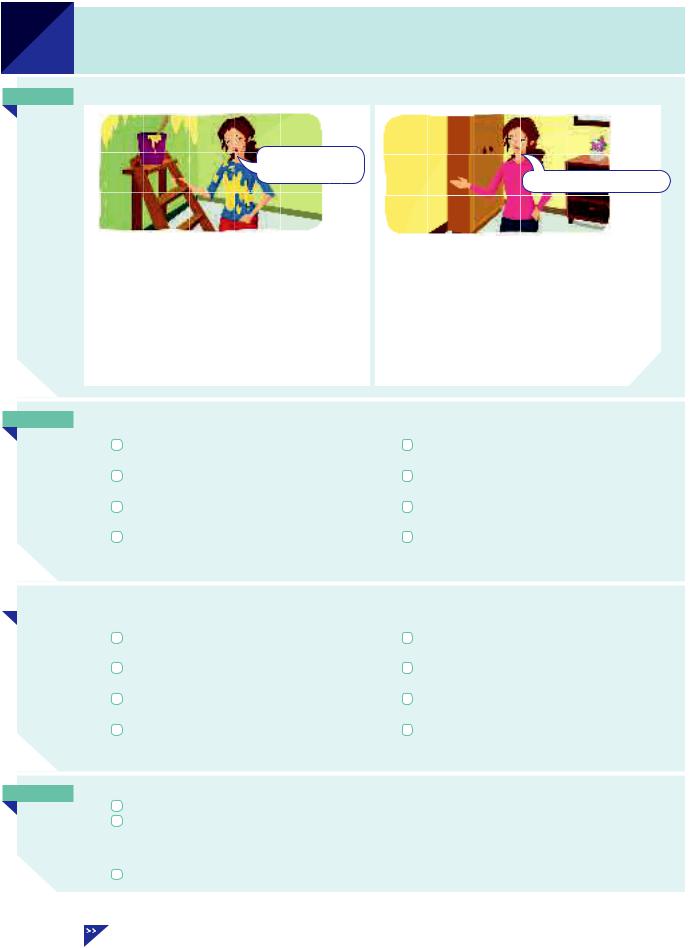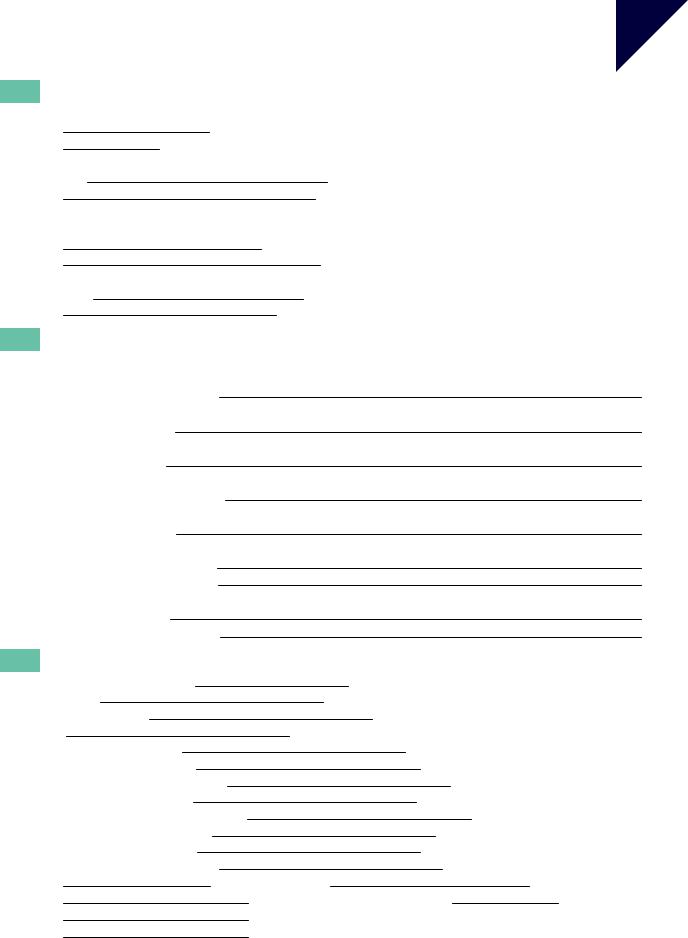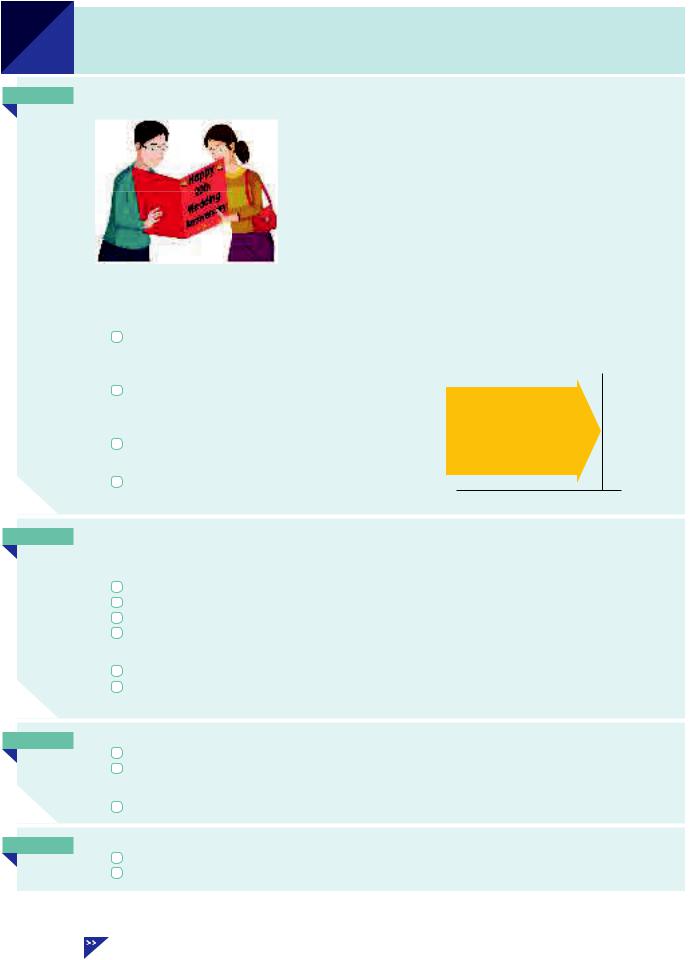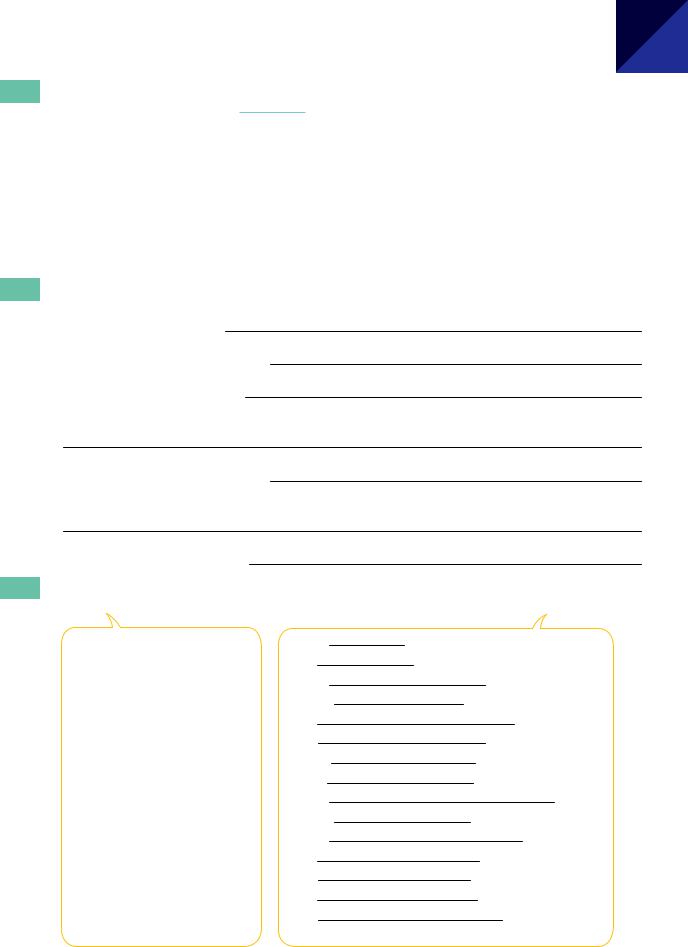
- •Contents
- •Thanks
- •To the student
- •To the teacher
- •3 Present continuous and present simple 1 (I am doing and I do)
- •10 Present perfect continuous and simple (I have been doing and I have done)
- •11 how long have you (been) … ?
- •12 for and since when … ? and how long … ?
- •13 Present perfect and past 1 (I have done and I did)
- •14 Present perfect and past 2 (I have done and I did)
- •15 Past perfect (I had done)
- •16 Past perfect continuous (I had been doing)
- •17 have and have got
- •18 used to (do)
- •19 Present tenses (I am doing / I do) for the future
- •20 I’m going to (do)
- •21 will and shall 1
- •22 will and shall 2
- •23 I will and I’m going to
- •24 will be doing and will have done
- •26 can, could and (be) able to
- •27 could (do) and could have (done)
- •28 must and can’t
- •29 may and might 1
- •30 may and might 2
- •31 have to and must
- •32 must mustn’t needn’t
- •33 should 1
- •34 should 2
- •35 I’d better … it’s time …
- •36 would
- •39 if I knew … I wish I knew …
- •40 if I had known … I wish I had known …
- •41 wish
- •42 Passive 1 (is done / was done)
- •43 Passive 2 (be done / been done / being done)
- •44 Passive 3
- •45 it is said that … he is said to … he is supposed to …
- •46 have something done
- •47 Reported speech 1 (he said that …)
- •48 Reported speech 2
- •49 Questions 1
- •52 Question tags (do you? isn’t it? etc.)
- •53 Verb + -ing (enjoy doing / stop doing etc.)
- •54 Verb + to … (decide to … / forget to … etc.)
- •55 Verb (+ object) + to … (I want you to …)
- •56 Verb + -ing or to … 1 (remember, regret etc.)
- •57 Verb + -ing or to … 2 (try, need, help)
- •58 Verb + -ing or to … 3 (like / would like etc.)
- •59 prefer and would rather
- •60 Preposition (in/for/about etc.) + -ing
- •61 be/get used to … (I’m used to …)
- •63 there’s no point in -ing, it’s worth -ing etc.
- •64 to … , for … and so that …
- •65 Adjective + to …
- •66 to … (afraid to do) and preposition + -ing (afraid of -ing)
- •67 see somebody do and see somebody doing
- •68 -ing clauses (He hurt his knee playing football.)
- •69 Countable and uncountable 1
- •70 Countable and uncountable 2
- •71 Countable nouns with a/an and some
- •74 the 2 (school / the school etc.)
- •75 the 3 (children / the children)
- •77 Names with and without the 1
- •78 Names with and without the 2
- •79 Singular and plural
- •80 Noun + noun (a bus driver / a headache)
- •81 -’s (your sister’s name) and of … (the name of the book)
- •82 myself/yourself/themselves etc.
- •83 a friend of mine my own house on my own / by myself
- •84 there … and it …
- •85 some and any
- •87 much, many, little, few, a lot, plenty
- •90 all every whole
- •91 each and every
- •92 Relative clauses 1: clauses with who/that/which
- •94 Relative clauses 3: whose/whom/where
- •95 Relative clauses 4: extra information clauses (1)
- •96 Relative clauses 5: extra information clauses (2)
- •97 -ing and -ed clauses (the woman talking to Tom, the boy injured in the accident)
- •98 Adjectives ending in -ing and -ed (boring/bored etc.)
- •99 Adjectives: a nice new house, you look tired
- •100 Adjectives and adverbs 1 (quick/quickly)
- •102 so and such
- •104 quite, pretty, rather and fairly
- •105 Comparative 1 (cheaper, more expensive etc.)
- •106 Comparative 2 (much better / any better etc.)
- •107 Comparative 3 (as … as / than)
- •108 Superlative (the longest / the most enjoyable etc.)
- •109 Word order 1: verb + object; place and time
- •110 Word order 2: adverbs with the verb
- •111 still any more yet already
- •112 even
- •114 in case
- •116 as (as I walked … / as I was … etc.)
- •117 like and as
- •119 during for while
- •121 at/on/in (time)
- •122 on time and in time at the end and in the end
- •123 in/at/on (position) 1
- •124 in/at/on (position) 2
- •125 in/at/on (position) 3
- •126 to, at, in and into
- •127 in/on/at (other uses)
- •129 Noun + preposition (reason for, cause of etc.)
- •130 Adjective + preposition 1
- •131 Adjective + preposition 2
- •132 Verb + preposition 1 to and at
- •134 Verb + preposition 3 about and of
- •135 Verb + preposition 4 of/for/from/on
- •136 Verb + preposition 5 in/into/with/to/on
- •137 Phrasal verbs 1 Introduction
- •138 Phrasal verbs 2 in/out
- •139 Phrasal verbs 3 out
- •142 Phrasal verbs 6 up/down
- •143 Phrasal verbs 7 up (1)
- •144 Phrasal verbs 8 up (2)
- •145 Phrasal verbs 9 away/back
- •Additional exercises
- •Study guide
- •Key to Exercises
- •Key to Additional exercises (see page 302)
- •Key to Study guide
- •Index

Unit
10
A
Present perfect continuous and simple (I have been doing and I have done)
Compare these two situations:
I’ve been painting my bedroom.
There is paint on Kate’s clothes.
She has been painting her bedroom.
has been painting is the present perfect continuous.
We are thinking of the activity. It does not matter whether it has been finished or not. In this example, the activity (painting the bedroom) has not been finished.
I’ve painted my bedroom.
The bedroom was green. Now it is yellow. She has painted her bedroom.
has painted is the present perfect simple.
Here, the important thing is that something has been finished. ‘She has painted’ is a completed action. We are thinking about the result of
the activity (the painted bedroom), not the activity itself.
BCompare these examples:
|
|
|
My hands are very dirty. I’ve been |
|
My bike is OK again now. I’ve repaired |
repairing my bike. |
|
it. (= I’ve finished repairing it) |
Joe has been eating too much recently. |
|
Somebody has eaten all the chocolates. |
He should eat less. |
|
The box is empty. |
It’s nice to see you again. What have you |
|
Where’s the book I gave you? What have |
been doing since we last met? |
|
you done with it? |
Where have you been? Have you been |
|
Have you ever played tennis? |
playing tennis? |
|
|
|
|
|
|
|
|
|
|
|
|
|
C |
|
We use the continuous to say how long (for |
|
We use the simple to say how much, how many |
|
|
|
||
|
|
something that is still happening): |
|
or how many times (for completed actions): |
|
|
How long have you been reading that |
|
How many pages of that book have |
|
|
book? |
|
you read? |
|
|
Amy is writing emails. She’s been writing |
|
Amy has sent lots of emails this morning. |
|
|
emails all morning. |
|
|
|
|
They’ve been playing tennis since 2 o’clock. |
|
They’ve played tennis three times this |
|
|
|
|
week. |
|
|
I’m learning Arabic, but I haven’t been |
|
I’m learning Arabic, but I haven’t learnt |
|
|
learning it very long. |
|
very much yet. |
|
|
|
|
|
|
|
|
|
|
DSome verbs (for example, know) are not normally used in continuous forms (be + -ing):
I’ve known about the problem for a long time. (not I’ve been knowing)
How long have you had that camera? (not have you been having)
For a list of these verbs, see Unit 4A. For have, see Unit 17.
But note that you can use want and mean in the present perfect continuous (have/has been + -ing): I’ve been meaning to phone Anna, but I keep forgetting.
|
Present perfect simple Units 7–8 Present perfect continuous Unit 9 |
20 |
Present perfect + for/since Units 11–12 |

Exercises |
Unit |
10 |
|
|
|
10.1 Read the situation and complete the sentences. Use the verbs in brackets.
1 |
Tom started reading a book two hours ago. He is still reading it and now he is on page 53. |
|
|
He has been reading |
for two hours. (read) |
|
He has read 53 pages so far. (read) |
|
2 |
Rachel is from Australia. She is travelling round Europe. She began her trip three months ago. |
|
|
She |
for three months. (travel) |
|
|
six countries so far. (visit) |
3Patrick is a tennis player. He began playing tennis when he was 10 years old. This year he won the national championship again – for the fourth time.
the national championship four times. (win) since he was ten. (play)
4 When they let college, Lisa and Sue started making films together. They still make films. They films since they let college. (make)
five films since they let college. (make)
10.2Ask questions using the words in brackets. Use the present perfect simple (have/has done) or continuous (have/has been doing).
1 |
You have a friend who is learning Arabic. You ask: |
|
(how long / learn / Arabic?) How long have you been learning Arabic? |
2 |
You have just arrived to meet a friend. She is waiting for you. You ask: |
|
(wait / long?) Have |
3 |
You see somebody fishing by the river. You ask: |
|
(catch / any fish?) |
4 |
Some friends of yours are having a party next week. You ask: |
|
(how many people / invite?) |
5 |
A friend of yours is a teacher. You ask: |
|
(how long / teach?) |
6You meet somebody who is a writer. You ask: (how many books / write?)
(how long / write / books?)
7A friend of yours is saving money to go on a world trip. You ask: (how long / save?)
(how much money / save?)
10.3Put the verb into the present perfect simple or continuous.
1 |
Where have you been? |
Have you been playing |
(you / play) tennis? |
||
2 |
Look! |
|
|
(somebody / break) that window. |
|
3 |
You look tired. |
|
|
|
(you / work) hard? |
4 |
‘ |
|
|
(you / ever / work) in a factory?’ ‘No, never.’ |
|
5 |
Where’s Lisa? Where |
|
|
(she / go)? |
|
6 |
This is a very old book. |
|
|
(I / have) it since I was a child. |
|
7 |
‘Have you been busy?’ |
‘No, |
|
(I / watch) TV.’ |
|
8 |
My brother is an actor. |
|
|
(he / appear) in several films. |
|
9 |
‘Sorry I’m late.’ |
‘That’s all right. |
|
(I / not / wait) long.’ |
|
10 |
Are you OK? You look as if |
|
(you / cry). |
||
11 |
‘Is it still raining?’ |
‘No, |
|
|
(it / stop).’ |
12 |
The children are tired now. |
|
(they / play) in the garden. |
||
13 |
|
|
(I / lose) my phone. |
(you / see) it? |
|
14 |
|
|
|
(I / read) the book you lent me, but |
|
|
|
|
|
(I / not / finish) it yet. It’s really interesting. |
|
15 |
|
|
|
(I / read) the book you lent me, so you can have it back now. |
|
21

Unit
11 how long have you (been) … ?
AStudy this example situation:
|
Dan and Kate are married. They got married exactly |
||||
|
20 years ago, so today is their 20th wedding anniversary. |
||||
|
They have been married for 20 years. |
|
|
|
|
|
We say: They are married. (present) |
|
|
|
|
|
but How long have they been married? |
|
|
|
|
|
|
|
|
|
|
|
(not How long are they married?) |
|
(present perfect) |
||
|
They have been married for 20 years. |
|
|||
|
|
|
|
|
|
|
(not They are married for 20 years) |
|
|
|
|
|
|
|
|
|
|
We use the present perfect to talk about something that began in the past and still |
|
|
|
|
|
|
|
present |
|
||
continues now. |
|
|
|
||
|
|
he is |
|
||
Compare the present and present perfect: |
|
|
|
||
|
|
we know |
|
||
|
Paul is in hospital. |
|
|
|
|
|
|
|
do they have |
|
|
but |
He’s been in hospital since Monday. (= He has been …) |
|
|
|
|
|
|
she is waiting |
|
||
|
(not Paul is in hospital since Monday) |
|
|
|
|
|
|
|
|
|
|
We know each other very well.
but We’ve known each other for a long time. (not We know)
Do they have a car?
but How long have they had their car?
She’s waiting for somebody.
but She hasn’t been waiting very long.
present perfect he has been we have known have they had
she has been waiting
past |
now |
BI’ve known / I’ve had / I’ve lived etc. is the present perfect simple.
I’ve been learning / I’ve been waiting etc. is the present perfect continuous.
When we ask or say ‘how long’, the continuous is more usual (see Unit 10):
I’ve been learning English since January.
It’s been raining all morning.
Richard has been doing the same job for 20 years. ‘How long have you been driving?’ ‘Since I was 17.’
Some verbs (for example, know and like) are not normally used in the continuous:
How long have you known Jane? (not have you been knowing) I’ve had these shoes for ages. (not I’ve been having)
See also Units 4A and 10C. For have, see Unit 17.
CYou can use either the continuous or simple with live and work:
Julia has been living in this house for a long time. or Julia has lived …
How long have you been working here? or How long have you worked here?
But we use the simple (have lived etc.) with always:
I’ve always lived in the country. (not always been living)
DWe say ‘I haven’t (done something) since/for …’ (present perfect simple):
I haven’t seen Tom since Monday. (= Monday was the last time I saw him) Sarah hasn’t phoned for ages. (= the last time she phoned was ages ago)
22 |
I haven’t … since/for Unit 8B Present perfect continuous Units 9–10 for and since Unit 12A |

Exercises
11.1 Which is right?
1 Ben is a friend of mine. I know / I’ve known him very well. (I know is correct) 2 I like your house. How long do you live / have you lived here?
3 You’ll need an umbrella if you go out now. It’s raining / It’s been raining. 4 The weather is / has been awful since I arrived here.
5 I’m sorry I’m late. Are you waiting / Have you been waiting long? 6 We’ve moved. We’re living / We’ve been living in New Street now.
7 I met Maria only recently. I don’t know / I haven’t known her very long. 8 Lisa is in Germany. She’s / She’s been there on a business trip.
9 That’s a very old bike. How long do you have / have you had it?
10I’m not feeling good. I’m feeling / I’ve been feeling ill all day.
11.2Read the situations and write questions using the words in brackets.
1 A friend tells you that Paul is in hospital. You ask him:
(how long / Paul / hospital?) How long has Paul been in hospital?
2You know that Jane is a good friend of Katherine’s. You ask Jane: (how long / you / know / Katherine?)
3Your friend’s sister went to Australia some time ago and she’s still there. You ask your friend: (how long / sister / in Australia?)
4You meet a woman who tells you that she teaches English. You ask her: (how long / you / teach / English?)
5Tom always wears the same jacket. It’s very old. You ask him: (how long / you / have / that jacket?)
6You are talking to a friend about Joe, who now works at the airport. You ask your friend: (how long / Joe / work / airport?)
7You meet somebody on a plane. She says that she lives in Chicago. You ask her: (you / always / live / in Chicago?)
11.3Complete B’s answers to A’s questions.
|
A |
|
|
B |
1 |
Paul is in hospital, isn’t he? |
Yes, he |
has been |
in hospital since Monday. |
2 |
Do you see Lisa very oten? |
No, I |
haven’t seen |
her for three months. |
3 |
Is Paul married? |
Yes, he |
|
married for ten years. |
4 |
Is Amy married? |
Yes, she |
married to a German guy. |
|
5 |
Do you still play tennis? |
No, I |
|
tennis for years. |
6 |
Are you waiting for the bus? |
Yes, I |
|
for about 20 minutes. |
7 |
You know Mel, don’t you? |
Yes, we |
each other a long time. |
|
8 |
Jack is never ill, is he? |
No, he |
|
ill since I’ve known him. |
9 |
Martin lives in Italy, doesn’t he? |
Yes, he |
|
in Milan. |
10 |
Sue lives in Berlin, doesn’t she? |
Yes, she |
in Berlin for many years. |
|
11 |
Is Joe watching TV? |
Yes, he |
|
TV all evening. |
12 |
Do you watch TV a lot? |
No, I |
|
TV since last weekend. |
13 |
Do you have a headache? |
Yes, I |
|
a headache all morning. |
14 |
Do you go to the cinema a lot? |
No, I |
|
to the cinema for ages. |
15 |
Would you like to go to New York |
Yes, I |
|
to go to New York. |
|
one day? |
(use always / want) |
|
|
Unit
11
23
